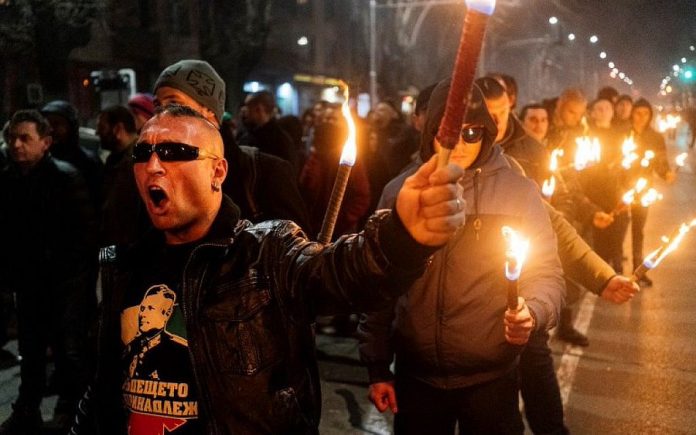The Global Project Against Hate and Extremism today released a report profiling 12 far-right extremist groups in Bulgaria. (Прочетете доклада на български)
The report, Far-Right Hate and Extremist Groups, Bulgaria (also available in Bulgarian – press release here), details 12 far-right groups, six of them political parties, that GPAHE identifies as embracing beliefs and activities that demean, harass, or inspire violence against people based on their identity traits including race, religion, ethnicity, language, national or social origin, caste, gender, sexual orientation, or gender identity.
Unlike some other EU countries, Bulgarian hate and extremist groups seem to be more focused on demonizing the country’s own minorities — specifically the Roma, and more recently, the LGBTQ+ population — than immigrants. According to the report, the majority of the groups adhere to at least two extremist ideologies, with the majority of groups being some combination of anti-LGBTQ+ and anti-Roma. This tracks with a 2022 report from the European Commission against Racism and Intolerance (ECRI) which described Roma and LGBTQ+ persons as the main victims of public expressions of hatred and prejudice by high-level Bulgarian politicians.
Anti-LGBTQ+ and Anti-Roma groups are especially widespread and influential throughout the country
“The overlap between anti-Roma and anti-LGBTQ+ groups in particular is something to watch out for,” said Wendy Via, president and co-founder of the Global Project Against Hate and Extremism. “Like we see in other parts of the world, these groups glom on to any hateful ideology as a way to build their base and their power, often leading to increased violence and hatred targeted at already marginalized people. It’s quite common for these groups to have roots in or connections to white nationalism and antisemitism as well.”
According to the report, most of the groups are based in or have headquarters in the capital city, Sofia. Half of the groups are political parties, including Attack (Атака), the first modern far-right party formed in 2005 and Revival (Възраждане), currently the third largest party in Bulgaria. Aside from Revival, far-right political parties struggle at the polls, but their influential leaders spew hateful and bigoted rhetoric and continue to be a threat to Bulgarians.
“The level of animus towards the Roma community is horrific in Bulgaria,” said Via. “And a significant factor in the problem is that those in positions of political power normalize, and sometimes lead, the bigotry against these historically marginalized people.”
For instance, as shown in our report, National Front for the Salvation of Bulgaria leader, Valeri Simeonov, who shockingly was head of the National Body on Ethnic Integration, has speculated about creating “modern concentration camps,” infamously described Roma as “brazen, feral, human-like creatures” and Romani women as having “the instincts of stray bitches.”
Some of the groups come together around the annual Lukov torch march, commemorating Hristo Lukov, who was Minister of War from 1935 to 1938, and a Nazi collaborator who played a key role in the deportation of Jews from areas occupied by the Bulgarian army in WWII. The march, first held in 2003, gathers far-right supporters, ultra-nationalists, and neo-Nazi groups from within Bulgaria and other countries. It is organized by the Bulgarian National Union (BNU), also named in the GPAHE report. While the march has been banned in recent years, smaller gatherings continue.
A number of the groups in the report have connections to, or have been inspired by, American far-right actors. For instance, Volen Siderov, the leader of Attack, has been photographed with former Ku Klux Klan leader David Duke and protests against COVID vaccines and lockdowns led by far-right party Revival featured American extremist symbols, including Confederate and “Don’t Tread On Me” flags. The chairman of Revival is also an outspoken fan of Donald Trump. The anti-LGBTQ+ groups featured in the report are connected to US-based groups that also peddle the same anti-LGBTQ+ hate and extremism in the US and in other parts of the world.
“Far-right extremist movements inspire terrorism, mass killings, and rights-restricting policies around the world, and the various movements are increasingly interconnected,” said Heidi Beirich, co-founder of Global Project Against Hate and Extremism. “Community safety and democracies are at risk. It’s critical that people, locally and globally, understand the far-right extremist landscape, how it operates, and how the dots are connected within countries and transnationally in order to counter the threats from these groups so we can get ahead of it. We hope these reports will help advocates and policymakers do that.”
The entire list includes the following groups:
Attack (Атака)
Bulgarian National Union (BNU) (Български национален съюз)
Bulgarian Socialist Party (BSP) (Българска социалистическа партия)
Freedom for Everyone (FFE) (Свобода За Всеки)
IMRO (Internal Macedonian Revolutionary Organization) (Вътрешна Македонска Революционна Организация/ВМРО)
Kubrat Youth (KY) (Кубрат Младост)
National Front for the Salvation of Bulgaria (NFSB) (Национален фронт за спасение на България)
National Resistance (NR) (Национална съпротива)
The People’s Party “The Truth and Only The Truth” (Народна Партия Истината И Само Истината)
Revival (Възраждане)
ROD International (Parents United for Children International) (РОД Интернешънъл)
Society and Values (Асоциация общество и ценности)
Bulgarian Far-right Hate and Extremist Groups is the fourth of a series of country reports released by GPAHE. The group has also released reports on France, Ireland, and Australia. Additional country reports will be released later in 2023.

